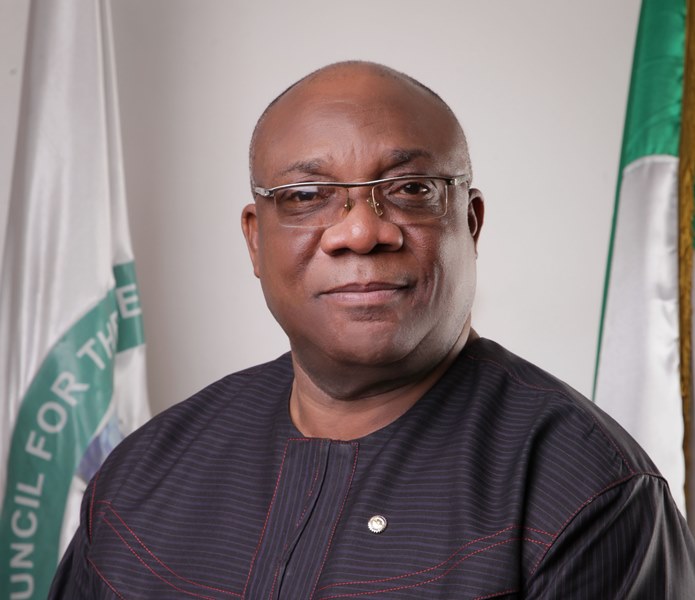… Traces efforts to secure approvals for POF collection
The Council for the Regulation of Freight Forwarding in Nigeria (CRFFN) has said that inadequate funding is the one of the major challenges preventing it from carrying out its mandate in the industry as expected.
The Registrar of CRFFN, Barr. Samuel Nwakohu who disclosed this in a news briefing at the Headquarters of the Council in Lagos on Wednesday disclosed that his overhead to run the affairs of the Council was N2.7 million per month even as he said that the release was not regular.
He said, “Some of you have heard me on several occasion talk about inadequate funding for the place (Council). My overhead to run the Council is N2.7 million per month and it is not regular. I think for last year, we either had seven or eight months, the releases don’t come as and when due. So, it becomes extremely difficult to run the Council.”
Nwakohu however said that on assuming office on the 1st of February, 2019, there was an ongoing project known as the Practitioners’ Operating Fee (POF) which he was made to understand was one of the various avenues for raising internally revenue for the country which he said was having hitches then.
“But for one year, we have been on it. I took over from where my predecessor stopped. I had to seek several approvals; we had to go to ICRC to make a business case. After that, we headed to the Federal Executive Council to seek approval. As God would have it, approvals were granted. We started the process of integration with the Nigerian Ports Authority, Nigeria Customs Service, NCAA (Nigerian Civil Aviation Authority). But as at today, I am delighted to say that we have been able to integrate fully with the Nigerian Ports Authority and the Nigerian Customs Service. We haven’t been able to integrate fully with NCAA, negotiations are still ongoing in that regard.
“Thereafter, we went to our parent Ministry to revalidate the approvals they gave in the past. The last place we went to was the Ministry of Finance because they are in-charge of most things to do with money. We went to the Ministry of Finance where we requested the Minister to give approval that POF payment should be a condition expedient to cargo exit at the ports and land borders. That took a while. That application was made around September, somewhere in-between, they asked for approvals from other federal government authorities, we sent it to them and we followed it up. As God would have it, on the 6th of January, this year, the approval was granted and on the 7th, we set out for sensitization.
“Now, you can see that we have been on standby because for approval to come on the 6th and for us to commence sensitization on the 7th, that tells you that we were waiting. We had made all the preparations but we didn’t want to go until we got that approval. So, we started sensitization exercise, basically informing stakeholders in the industry, freight forwarders in particular of how POF will change in function, that it is not going to be a manual thing, it is going to be fully automated. We had one at the Rockview Hotels, Apapa, after that, we moved on to the South-south zone, we had another one in Port-Harcourt which covered the entire South-south. Then, we left Port-Harcourt and went for Kano for the northern zone. After that, we came back; we had a long meeting with terminal operators, the Chairman of STOAN.
“Initially she thought we wanted them to collect for us, I said no. She was very happy because she said that was where the problem is going to be, that her people didn’t want to get involved in POF collections. But I said to her no, we have a Federal Executive Council mandate asking that SW Global, our technical partners to be the ones to collect that fee and she was delighted with that and at the end of the day, we held a meeting and we talked about how they were going to support it. She said she was all in it. We agreed on integration which she said will take about three to four weeks but that will not stall the commencement of the POF.
“You generate, you make payment against an invoice generated for you. You have to clear it with them because for those of you who are familiar with the processes of clearing at the port will know that that is the last port of call for you to take your container out. You must be able to show evidence that you have paid before you can take your container out. That is what it is all about with them. By the time we integrate fully, all we need do is give them the reference number through your bill of lading, they will crosscheck on their own system and that will be it. But before then, whatever we generate at this end, we will push it to them, they will tick it off if you have paid, if you haven’t pay, you can’t go with your cargo.So, that was the last meeting we have had and since then, we have been working with our technical partners up till thirty minutes ago trying to cross the Ts and dot the Is”, he explained.
While informing that they were ready to commence POF collection, the Registrar observed that they were hoping that any moment from now, POF would go live noting that “it will no longer be business the way it was done before for industry practitioners where we regulate. They have to go through the processes.”
Photo: CRFFN Registrar/CEO, Barr. Samuel Nwakohu.
Send your news, press releases/articles to augustinenwadinamuo@yahoo.com. Also, follow us on Twitter @ptreporters and on Facebook on facebook.com/primetimereporters or call the editor on 07030661526, 08053908817.

